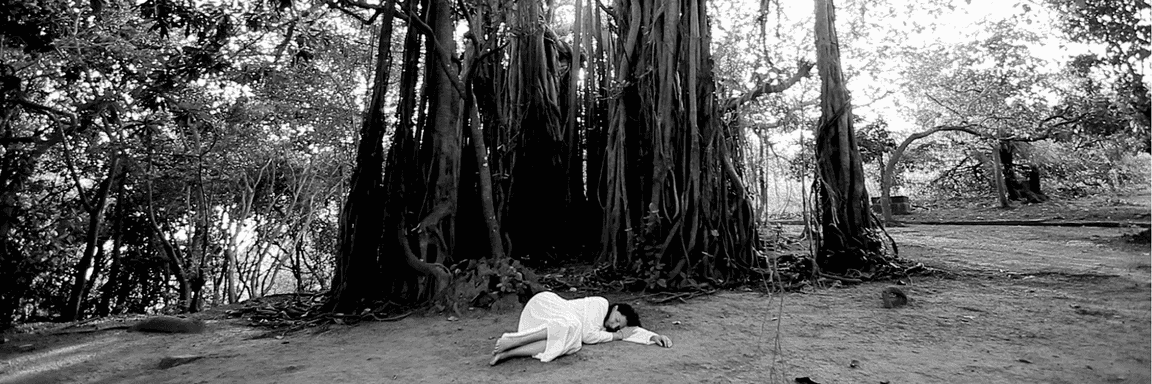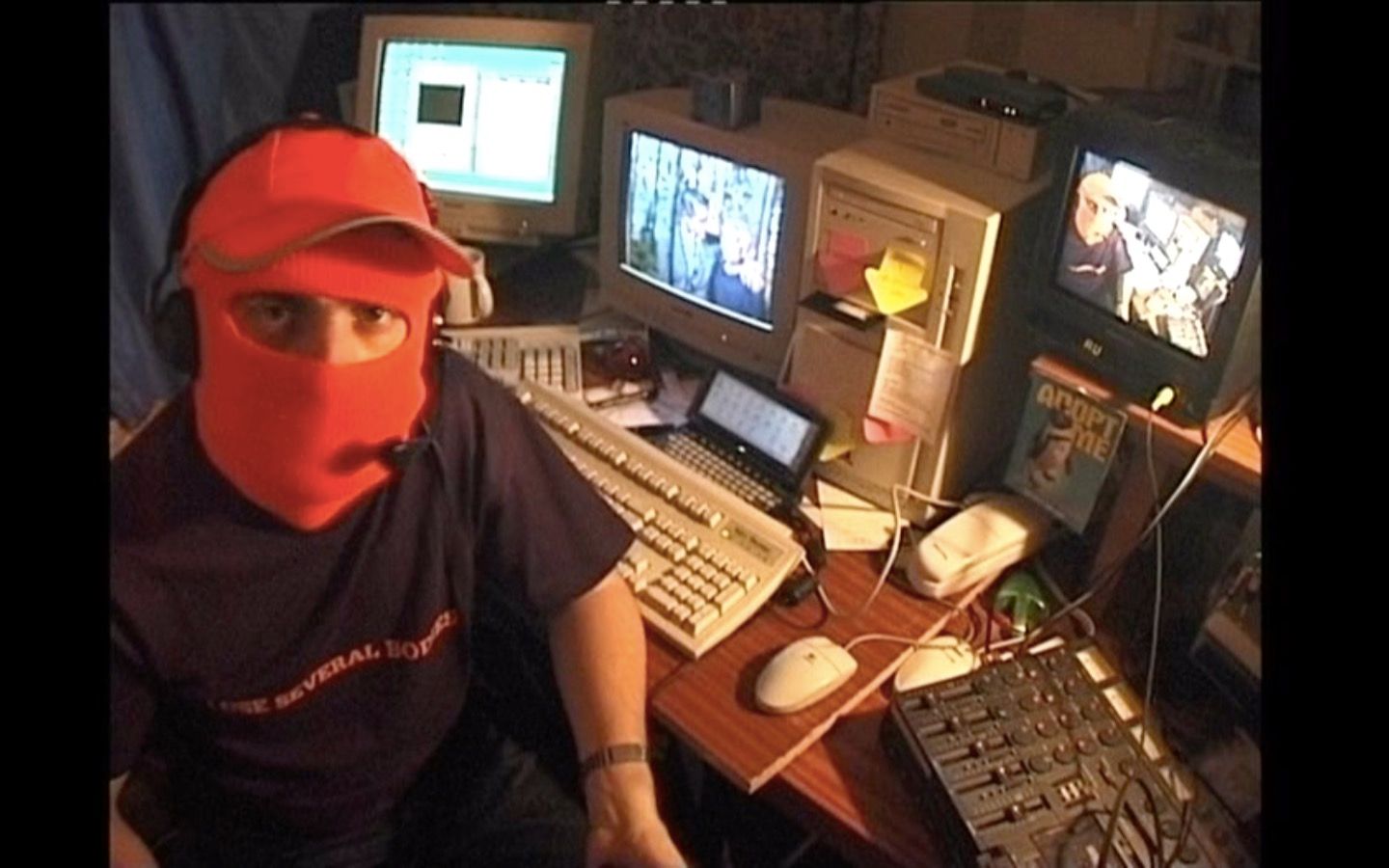
Part Three of Many Parts: Trick or Tree!
Another collaborative exhibition from LI-MA and West, Den Haag.
Once again, LI-MA is teaming up with West, Den Haag, in this collaborative series of exhibitions. Part Three of Many Parts: Trick or Tree! showcases a selection of video works, this time focused on video's ability to change and construct meaning: from image manipulation to worldbuilding. The exhibition features works by Michiel van Bakel, Robert Arnold, Marina Abramović, Manuel Saiz, Seoungho Cho and Ghita Skali.
Video artists use technological means to distort, change and twist images. They celebrate and experiment with video as a decidedly manipulative and manipulable medium. In the exhibition Part Three of Many Parts: Trick or Tree!, six artists pull out all the stops to visually and mentally awaken the viewer by presenting known reality in a new, surprising way.
Through their work they show that everything is a construct, and how this can be explored in a playful and critical way, with the possibilities of their medium. In Video Hacking (1999, pictured below), for example, Manuel Saiz disguises himself as an artistic hacker who puts a new spin on videotapes of film classics. Ghita Skali uses a completely different tool to question prevailing worldviews. In her video essay Does Elon Musk have a watering can? (2023), she prompts ChatGPT to answer questions about a wateringcan, revealing a painful misunderstanding surrounding this everyday object.

Some of the artists in Trick or Tree! also focus on their surrounding landscape. This is another property of video art: it allows artists to visualise their view of the (outside) world. Sometimes this is simply to involve the viewer in the passage of time – as sleeping Marina Abramović shows in Sleeping Under the Banyan Tree (2010, pictured above). Elsewhere, it is to question and gently tinker with prevailing and often entrenched power structures and systems.
Wikipedia writing workshop with Ghita Skali & Annika Hendriksen
28 March
19.00–21.00
During the exhibition, artist Ghita Skali will be invited to give a talk during a writing workshop on 28 March. Participants will learn how to help increase the visibility of media art, thanks also to the presence of Wikipedian Annika Hendriksen.
Artworks
- Michiel van Bakel, Panorama Tata – a plumed serpent’s view, 2024, 7'47''
- Robert Arnold, Zeno's Paradox, 2003, 5'15''
- Marina Abramovic, Sleeping Under the Banyan Tree, 2010, 56'43''
- Manuel Saiz, Video Hacking, 1999, 4'20''
- Seoungho Cho, Linear Tracking, 2000, 12'24''
- Ghita Skali, Does Elon Musk have a watering can?, 2023, 6'51''
Bios
Michiel van Bakel was born in 1966 in Deurne, the Netherlands, and currently lives in Rotterdam. He briefly studied astronomy and psychology before switching to art and attending the art academy in Arnhem. Originally a classical sculptor, in recent years his focus has shifted to multimedia works in which spatial relationships are still a main concern. His works have received awards at international film and video festivals, including the first prize at the Black Maria Festival (USA) in 2004 and the Special Jury Prize at Video Lisboa in 2000.
Robert Arnold was born in 1954 in New Jersey, USA, and lives in Boston where he teaches film at Boston University. He obtained a BFA in Sculpture from the University of Illinois in 1977, an MA from the University of Iowa in 1980 and a PhD in Film Studies from the University of Iowa in 1994. He has received numerous awards and fellowships and his works have been widely exhibited. Arnold's approach is based on advanced digital editing techniques, which he uses to create short videos, designed to be exhibited on a loop.
Marina Abramović was born in 1946 in Belgrade, Yugoslavia, has lived in Amsterdam and Berlin and is currently living and working in New York City. She attended the Academy of Fine Arts in Belgrade from 1965-1970 and did postdiploma studies at the Academy of Fine Arts in Zagreb, Croatia, from 1970-1972. Abramovic has exhibited all over the world and a large amount of writing exists on her work. She has taught at various art schools including the Academy of Fine Arts in Novi Sad, the Hochschule für Bildende Künste in Hamburg and the Académie des Beaux-Arts in Paris.
Manuel Saiz is an artist, filmmaker and writer living in Berlin. His work ranges from video installations to books and films. During the past 15 years Saiz has focused mainly on art films and video installations. His films have received special mentions and awards at Hamburger Short Film Festival, Winterthur Kurtztfilm Festival and Transmediale 06, and been shown at Impakt Festival, EMAF, London Film Festival and many others. His installations have been shown in Intercommunication Center (Tokyo), Transmediale (Berlin), Whitechappel gallery (London), ICA (London), among other international venues.
Seoungho Cho was born in 1959 in Pusan, South Korea, and currently lives and works in New York. He received a BA and an MA in graphic arts from Hong-Ik University, Korea, and an MA in video art from New York University. He has had solo exhibitions in many prestigious venues such as the Museum of Modern Art in New York and his videos have been shown in biennales and group screenings throughout Europe and North America. Cho has received various awards and grants, including ones from the Jerome and Rockefeller foundations. Cho uses digital image processing techniques to manipulate simple, everyday objects, scenes or landscapes into highly lyrical sound and image collages.
Ghita Skali (born in Casablanca, Morocco in 1992) lives and works in Amsterdam. Her multidisciplinary practice, which led to her nomination for the Prix de Rome 2023, encompasses installations, videos and interventions. Ghita uses odd news, rumours and propaganda to disrupt institutional power structures, such as the Western contemporary art world, state oppression and government politics. Her work blends humour and critique, and reaches beyond the art world.
Read an interview with Ghita Skali on our media art blog.
Images: Marina Abramović, Sleeping Under the Banyan Tree (2010) and Manuel Saiz, Video Hacking (1999).






